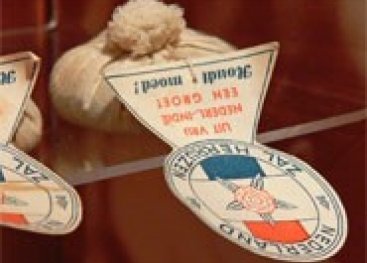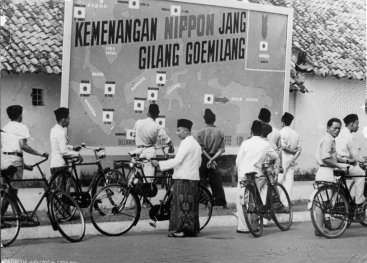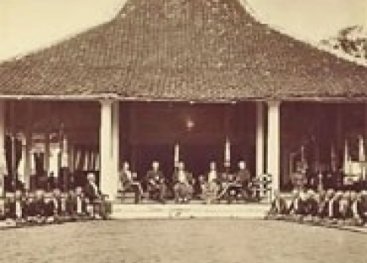
Liberation and Bersiap/Berdaulat
Tineke Meelhuysen
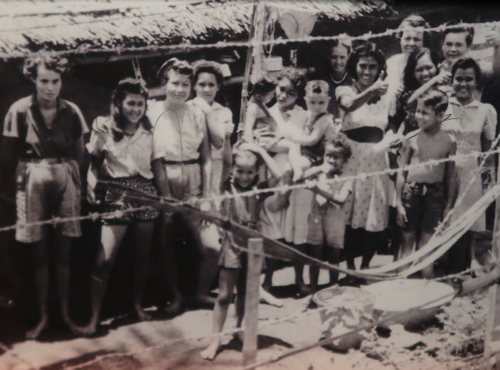
camp after liberation.
“Around three o’clock in the afternoon, the camp leader got onto a table and said: ‘Ladies, ladies, the war is over. Peace has come.’ Everyone just kept on doing what they were doing, because they thought she’d gone crazy. But slowly we began to realise that it was true. We wanted to go home right away, but were advised not to. Some wanted to fly the Dutch flag. That too was discouraged, because it was too dangerous. This was not how I had expected peace to be. It was a huge disappointment.”
Tineke Meelhuysen was near the fence of Camp Banjoebiroe when she heard the news about the liberation.
Be prepared
On 6 and 9 August 1945, the American dropped two devastating atomic bombs on the Japanese cities of Hiroshima and Nagasaki. Japan surrendered on 15 August. Two days later, Indonesian nationalists declared independence: the Republik Indonesia.
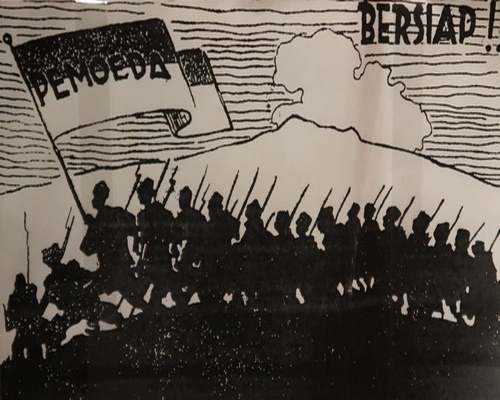
The joy of liberation lasted only a short while for the Dutch and Dutch East Indians. Indonesian youngsters (pemuda) attacked their former rulers with machetes, bamboo spears and the battle cry ‘Bersiap’ (Be prepared). They flew the red-and-white Indonesian flags and wrote anti-Dutch slogans on walls.
Protected by the Japanese and the British
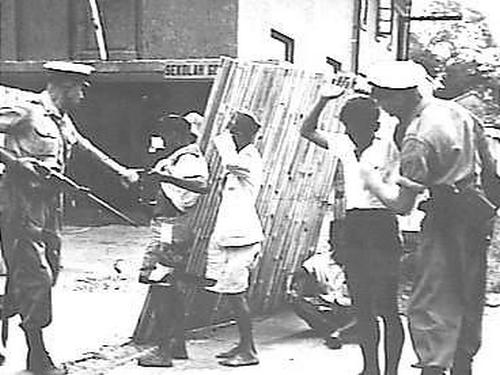
There were bloody fights between the allied liberators and the nationalists. The British only protected a small area around the cities. The majority of the country was controlled by Indonesian nationalists. Most detainees therefore remained in the camps, where they were protected by the Japanese and the British.
Outside the protected areas, tens of thousands of Dutch East Indians were arrested by Indonesians and detained in Republican camps. Thousands of Dutch and Dutch East Indian people were killed during this ‘Bersiap’ period.
Personal Stories - The Wilhelmus
Dutch East Indian Frans Kayatoe heard the news of the Japanese surrender in the kampong.
“My uncle Chris had a radio. On 15 August 1945, we heard the report that Japan had surrendered. We drank a toast and sang the Wilhelmus national anthem. The next day, a native guerrilla fighter came by. He was family. He warned us about the natives from the mountains. They were sure to kill us. We had to get to the city as soon as possible to find protection.”
Red and white
After the Japanese surrender, Louis Verschoor volunteered to join the Red Cross in Surabaya.
“Every day, I had to work my way through hostile crowds to get to the lodge where the Red Cross was housed. One day a few Dutch people had raised the Dutch flag. The Indonesians saw this as a provocation and ripped off the blue part. That just left the Republican red and white. It caused a huge fight. Luckily I was able to get to the lodge just in time.”
Simpang Club
Brothers Piet and Bob Meelhuysen were arrested by the Indonesian pemuda.
Piet: “They were boys, heavily armed with rifles and Japanese samurai swords that were bigger than they were. We were taken to the Simpang Club, which was full of men and boys. We had to crouch down and not look up. There was horrible screaming coming from behind us. Many people were murdered. It was the first time in my life that I was really scared. It was an indescribable fear.”
Soemobito
During the ‘Bersiap’ period, Frank Neijndorff and his mother and sister were detained by the Indonesians in the Republican Camp Soemobito.
“We ended up looking like living skeletons. Every day we’d be given a cigarette tin with rice and Kangkoeng, the cheapest type of vegetable. We had to cook it ourselves. We would catch rainwater and save it in tins and bottles. We turned the Kangkoeng into sajur (soup). You could have called it fly soup, because the only bits of meat floating in it were flies that had lost their way.”
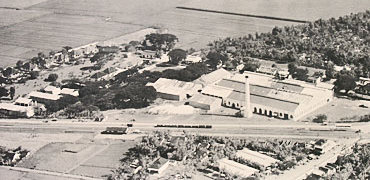
An emotional reunion
From April 1946, the detainees in the Republican camps were evacuated by the British and the Dutch to areas that were under Dutch protection. Rob Kopijn, his mother and his two sisters were taken to an airport in trucks. They had never flown before. They were taken to Semarang in an old Dakota plane. “Once there, we had our heads shaved, were deloused and given new clothes. The next day, we were taken to Surabaya by ship. It was hours before we moored. The women on the ship were looking out for their men on the quayside. My eldest sister had spotted our father amongst all those men: he was waving from on top of a car. We were finally allowed to disembark in the early evening. It was an emotional reunion.”
